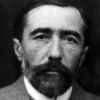Joseph Conrad

Joseph Conrad
Joseph Conradwas a Polish-British writer regarded as one of the greatest novelists to write in the English language. He joined the British merchant marine in 1878, and was granted British nationality in 1886. Though he did not speak English fluently until he was in his twenties, he was a master prose stylist who brought a non-English sensibility into English literature. He wrote stories and novels, many with a nautical setting, that depict trials of the human spirit in the midst...
NationalityPolish
ProfessionNovelist
Date of Birth3 December 1857
CountryPoland
And perhaps in this is the whole difference; perhaps all the wisdom, and all truth, and all sincerity, are just compressed into that inappreciable moment of time in which we step over the threshold of the invisible.
I am afraid that if you want to go down into history you'll have to do something for it.
I saw him open his mouth wide. . . as though he had wanted to swallow all the air, all the earth, all the men before him.
The mind of man is capable of anything--because everything is in it, all the past as well as all the future. What was there after all? Joy, fear, sorrow, devotion, valor, rage--who can tell?--but truth--truth stripped of its cloak of time.
Madness alone is truly terrifying, inasmuch as you cannot placate it by threats, persuasion, or bribes.
Never test another man by your own weakness.
The very young have, properly speaking, no moments. It is the privilege of early youth to live in advance of its days in all the beautiful continuity of hope which knows no pauses and no introspection.
It made you feel very small, very lost, and yet it was not altogether depressing, that feeling. After all, if you were small, the grimy beetle crawled on - which was just what you wanted it to do.
I found myself back in the sepulchral city resenting the sight of people hurrying through the streets to filch a little money from each other, to devour their infamous cookery, to gulp their unwholesome beer, to dream their insignificant and silly dreams. They trespassed upon my thoughts.
I have a voice, too, and for good or evil mine is the speech that cannot be silenced
Everything belonged to him. It made me hold my breath in expectation of hearing the wilderness burst into prodigious peal of laughter that would shake the fixed stars in their places.
Here's the main page of motivational quotes, if you want a different topic. Gossip is what no one claims to like, but everybody enjoys.
I remember my youth and the feeling that will never come back any more /the feeling that I could last for ever, outlast the sea, the earth, and all men; the deceitful feeling that lures us on to joys, to perils, to love, to vain effort /to death; the triumphant conviction of strength, the heat of life in the handful of dust, the glow in the heart that with every year grows dim, grows cold, grows small, and expires /and expires, too soon, too soon /before life itself
Every age is fed on illusions, lest men should renounce life early and the human race come to an end.